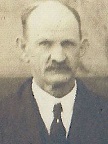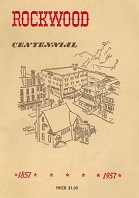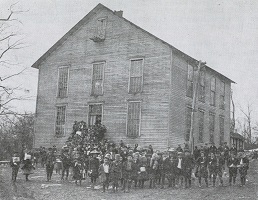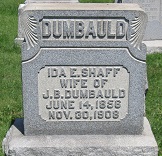
|
Jonathan 'Beecher' Dumbauld |
|
|
| J. Beecher Dumbauld |
He was a longtime farmer and land investor, and early in his working career worked as a merchant. Circa March 1885, when he would have been age 25, Beecher erected a new house for himself and, said the Somerset Herald, was "busily engaged in getting out lumber."
Later in 1885, given his "considerable experience in the mercantile business," reported the Herald, he was named by the Commissioners of the County of Somerset as Mercantile Appraiser.
Beecher was married twice, first to Felecia G. Flanigan (1867-1897).
The couple produced one known son, Alva S. Dumbauld.
Grief blanketed the young family when their infant son Alva died at the tender age of three months on Aug. 31, 1892. His remains were placed at rest in the Church of God Cemetery in Kingwood.
Beecher and Nelson Romesburg were elected school directors of Upper Turkeyfoot in February 1897.
Heartache compounded within this family just five years later when Felecia passed into eternity on Sept. 7, 1897, at the age of 30 years, one month and 24 days. Burial also was in the church cemetery.
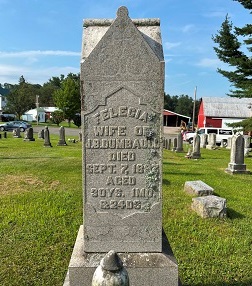 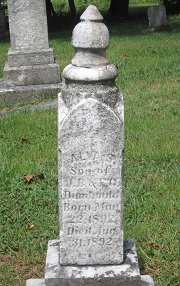 |
| Graves of mother and son, Felicia and Alva, Kingwood |
After about two years as a widower, Beecher wed his second bride, teacher Ida E. Shaff (June 1856-1908), daughter of John Cramer and Josephine (Will) Schaff, on Aug. 17, 1899. He was age 40, and she 43, at the time.
No children were born to the second marriage.
Ida is mentioned by name in a list of early Rockwood school teachers in the booklet Rockwood Centennial 1857-1957.
When the federal census was enumerated in 1900, the Dumbaulds were newlyweds and lived in Upper Turkeyfoot. That year, Beecher earned a living as a dry goods merchant, and 26-year-old servant Mary Ann Hechler dwelled under their roof.
Beecher and Ida relocated to Colorado in the early 1900s -- with evidence suggesting the move may have been made for her health -- and initially dwelled in Colorado Springs. Then in January 1904, said the Larimer County Independent, he "closed a deal this morning by which he becomes vested with the title to a handsome and well cultivated farm in the Boxelder valley, adjoining the town of Wellington, and will enter into possession of it as soon as he can bring his family here from the Springs."
|
Booklet naming Ida and picturing the school where she taught |
Life in Larimer seems to have appealed to the Dumbaulds. An August 1904 edition of the Fort Collins Express reported that Beecher and T.J. Miller were going to take a fishing trip "and get back for harvest." Several days later, the Express observed that the two men had returned "looking fat and contented" and "well filled with mountain trout."
|
| New Centerville, PA |
Ida was stricken with kidney disease for many years. In the spring of 1908, she underwent surgery in a Fort Collins hospital. As she convalesced in June that year, she and Beecher left for Southern California, "in hopes that a lower altitude and the ocean air would improve her health," said the Independent. "She has been very sick for a long time." The couple established a home in the community of La Mesa, San Diego County, and Ida's health initially improved.
Beecher and Ida are believed to have returned to Colorado in September 1908 to enter his durum wheat in an exhibition of farm produce hosted by the Wellington Development Company, taking second prize. The purpose of the event was to showcase the "great natural resources and advantages of the Wellington district," said the Independent.
Beecher was plunged into controversy in October 1908 when the local Laramie-Poudre Reservoirs and Irrigation Company sued him to condemn part of his farm, likely so it could be used for public water purposes. The company dug a ditch on his property. He appears to have made a counter complaint, and a jury awarded him $3,000 in damages. When the company appealed the case, the jury took an automobile trip to view the alleged damages at the farm. The Independent reported that Beecher's lawyer commented that "the irrigation company in building the ditch, piled the dirt so high that a mound thus created is designated in the entire neighborhood as Mount Nebo. The attorney, while discussing the scriptural phase of the controversy, mentioned that this particular Mount Nebo would not have answered for Moses' burial place, as it would have been impossible for a funeral procession to proceed up its steep slopes.... The jury is to determine the value of the land taken in building the ditch, as well as the damage to the remainder, if they hold tht the land has been damaged."
Within just a few weeks of the legal appeal, however, Ida's kidney disease continued to become even more serious. Sadly, she passed away at the age of 52, after just nine years of marriage, on Nov. 30, 1908. Funeral services were held in their home. The remains then were placed on the 4 p.m. train for transport back to Somerset County. Burial was in the Union Cemetery next to the Messiah Evangelical Lutheran Church at New Centerville.
The grieving Beecher traded his farm to A.C. Johnson in August 1909, taking two houses in the town of Wellington, but with him remaining on the farm temporarily to complete his crop harvest. Once the move was completed, he left for a month-long visit with family back in Somerset County. He returned to Wellington at the end of November 1909, likely having received assurance of help from his Pennsylvania family, and then bought a farm from A.A. Cook north of town.
The Express described the Cook farm as 80 acres located at the northwest corner of Wellington, purchased for $6,500, and an additional 15 acres of adjoining pasture along Boxelder Creek. "There is a new house on the place, only partially completed, and a splendid well of water. Mr. Dumbauld has traveled around the country considerably and thinks the Wellington country the equal of anythig he has yet seen."
The U.S. census of 1910 lists the widowed Beecher as a farmer residing in Larimer, with 23-year-old nephew Jacob G. Dumbauld (son of Peter) in the household, assisting with farm labor. That year, in May, he went to Texas, perhaps to view even more possibilities for expanding his holdings. In the fall of 1911, now living in Curtis, CO, he was noted in a local newspaper for having received the town property in trade for a Fort Collins tract. He is known to have attended the 1911 Harvest Jubilee in Fort Collins.
He was referenced as living in Pike View, near Colorado Springs, CO when mentioned in the 1915 Meyersdale Commercial obituary of his brother Daniel.
Research clues hint that Beecher wed a third time, on Feb. 16, 1916, in Denver, to Mary V. Nelson ( ? - ? ). The nuptials were performed in the Roman Catholic rite by Fr. E.J. Mannix. Mary had been married previously and brought a daughter to the union, Pauline Nelson, of Denver. They made a home at 829 West Mountain Avenue in Fort Collins.
Beecher in February 1919 flipped a farm he had purchased southwest of Fort Collins, known as the Tumbaugh property, to buyer C.J. Anderson. He placed for sale advertisements for currants in the local Fort Collins newspaper in July 1919, priced at five cents per pound, at his farm northeast of Terry Lake.
In June 1920, he acquired a farm of 320 acres near Alamosa in Colorado's San Luis Valley. His friend Carl Anderson described the valley to a Fort Collins Coloradoan reporter as "rich in possibilities, it having many advantages over other sections that lie on the frontier. One going to that country he says must not expect to find as fine a looking country as the Poudre Valley for if he does, he will be disappointed but he will find a country that nature has done a lot for. The whole valley lies as level as a floor, has excellent soil and the very best of water right."
The couple relocated to Alamosa in the middle of 1920. He continued to evaluate farm tracts in the region.
Grief blanketed their lives in May 1922 when Mary contracted pneumonia. She succumbed to the illness in early May 1922, with burial of the remains in La Jara, Conejos County, CO. A notice of her passing was printed in the Express.
Beecher remained in Colorado for several years after Mary's death. He is known to have dwelled in Denver in 1926, at the death of his brother Peter. He wed a fourth time, to Isabelle Burrows ( ? - ? ), in Denver on Dec. 4, 1930, with Rev. Loren M. Edwards presiding. Sadly, she is thought to have died within a few years.
By 1934, Beecher was in Tonkawa, Kay County, OK and sharing a home with his nephew D.E. Kreger. The two men returned to Somerset in November 1934 to visit relatives. They stayed for several days with Beecher's nephew George Newton Schrock, reported the Daily American.
Mr. Dumbauld, born in Upper Turkeyfoot township, son of Jonathan Dumbauld, is the last of his family. His memory of early days of Somerset are quite vivid. Particularly does he remember the disastrous fire of '76, when he was serving in the commissioners office in the Court House. He took upon himself to offer $10 to anyone who could carry water to pour on that building to save it from flames. He was quite active in politics later on in life and earned for himself the name of "political war-horse", which appelation stuck for many years. After marriage, Mr. Dumbauld conducted a general store at Markleton for many years, eventually moving to Colorado, that his wife's health might be bettered. There he lived for thirty years, and in 1931 his wife, a daughter of John Shaff of New Centerville having died some years before, Mr. Dumbauld moved to Oklahoma to reside with his nephew. Telling of the climatic conditions of Oklahoma, Mr. Dumbauld said that during the past summer for forty days the thermometer hovered between 110 and 115 degrees fahrenheit. The venerable gentleman has many friends in the east, and talks fondly of them all. He particularly well remembers Miss Ella Ferner, who was his school teacher sixty years ago in a little country school in Upper Turkeyfoot
Toward the end of his life, Beecher returned to Somerset County, and shared a home in Kingwood with Edith Kreger. There, he died of a coronary occlusion on April 12, 1940, at the age of 79. Burial was in the Kingwood Church of God Cemetery, near the graves of his first wife and infant son, with Rev. J.I. Kalp preaching. J.B. Dumbauld provided information for his Pennsylvania death certificate. An obituary in the Daily American said that "Three wives and a son preceded him in death. A large number of nieces and nephews survive."
Copyright © 2014-2018, 2020, 2025 |
Research for this page
graciously shared by the late Donna (Younkin) Logan, Clark
Brocht and Linda Marker and Ryan and Michele Sechler. |
